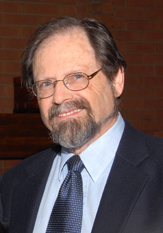Reflecting with Reynolds

On Thursday, December 9 the College honored Stephen Reynolds for his 17 years of service as associate dean. Steve served three deans, Donna Gelfand, Steve Ott and David Rudd. Reynolds offered a number of reflections in a recent interview.
Making a college education more accessible is an underpinning tenant of Reynolds’ tenure. For years, Reynolds always taught at night in order to lead the way in providing more options for students. He also championed online courses to assure students online access to education. The college now has several full majors as online offerings.
"Generally, we have increased access—and not just haphazardly but the ability to complete a degree program," Reynolds remarked.
Reynolds was also an early advocate of student advising beyond 5 p.m. He acknowledged that while there aren’t many students on campus in the late afternoon and evenings there ought to be services for those still present.
"I’ve always tried to see each student as an individual and address them in that way," Reynolds said.
Speaking of students, Reynolds noted that "students are pretty much students" when asked to compare them then and now. However, he acknowledged how technologically savvy students are but isn’t convinced that technology has affected them negatively or positively. "We’ve always had very bright students at the U—always will," remarked Reynolds. "What has changed is the bottom. Due to higher admission standards the variance has changed (spoken like a true economist). We don’t get as many students who struggle."
Under Reynolds’ watch information technology infrastructure for college faculty, students, and staff has been a priority. "Our people must have the tools to do their jobs."
Reynolds noted that development has become a greater priority with each successive dean—reflecting a trend University-wide and nationally among higher education institutions. He remembered Dean Gelfand initiating the college advisory board and subsequent honor roll scholarship program in the mid-90s.
Reynolds returns to the economics faculty full time where his primary emphasis is international economics and economic development with a particular interest in Southeast Asia. "When I wrote my dissertation in 1968, there was still reason to be pessimistic about economic development in the region," Reynolds reflected. "In the 60s, the Philippines was the most industrialized country except for Japan and look at the region now—huge changes … an interesting area."
